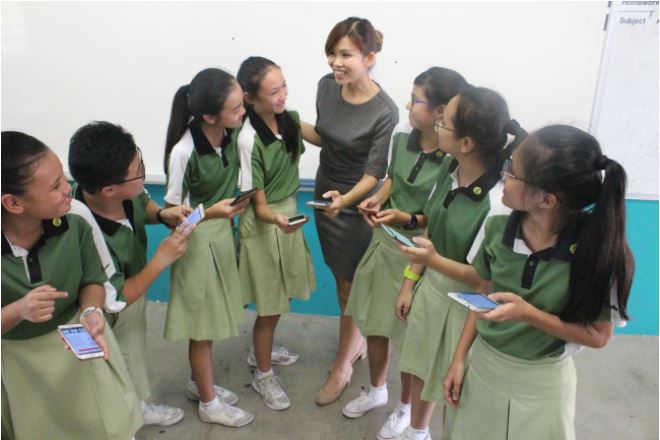Teaching students to make sense of what they read online
13 Apr 2021

Ms Mavis Ho empathises with parents trying to understand why their teenage children get upset after reading something online. The Cyber Wellness Coordinator for Pasir Ris Secondary shares how she helps her students find their own way through difficult topics.
As Cyber Wellness Coordinator for Pasir Ris Secondary School since 2014, Ms Mavis Ho leads in the planning, implementation and review of their Cyber Wellness programmes. She is also a Secondary 2 Form teacher, and thus has seen her share of students upset over things they encountered online.
Today, she says her students mostly get worked up over social or racial injustice they encounter on social media, as well as reports of doxing. While the specific events can be completely different, the steps Ms Ho takes to calm her students down remain similar.
Start a conversation
Ms Ho recalls how excited her Secondary 3 English class got when one of her students asked if anyone had read about the incident involving a private-hire driver and a female passenger.
The news had gone viral after the driver had uploaded a video recording showing the woman accusing him of trying to cheat her, when he could not avoid the Electronic Road Pricing (ERP) gantries during the journey. Netizens were riled up by the way the woman asked: “Is it because I’m Chinese?” Her cultural insensitivity was a sticking point for Ms Ho’s students too.
Some of the students said they couldn’t believe the woman would say such a thing. One criticised her for bringing race into the issue.
Rather than tell the class what the right thing to do was, Ms Ho opened the discussion to the class.
Stop and reflect
Some students admitted to looking up for more information about the woman online. They found out that netizens had started doxing the woman, by sharing her name, age, and social media accounts online. Several students also pointed out that the woman had become an internet meme, with her likeness and the line “Is it because I’m Chinese?” being turned into Whataspp stickers.
When Ms Ho was asked for an opinion of the incident, she told her students to stop and reflect: How would they feel if they were in the shoes of the woman? Could it be that she had a bad day? Do you think she regrets what she said?
The class calmed down as they considered the different options and looked at the situation from the perspective of the woman. Some students said they felt bad for secretly wanting to participate in posts by internet vigilantes. Others shared that they now felt maybe the woman made a mistake in over-reacting and they should be more forgiving towards her.
Don’t be hasty to react
Ms Ho remembers another occasion when she asked her class if they felt blogger Amos Yee was too extreme in his opinions. The class agreed – perhaps too readily – with many going on to share their own opinions of him.
Her next question: Do you see characteristics in yourselves similar to Amos Yee’s when developing opinions?
This made the class fall silent for a while as they reflected. Eventually, Terry, the class Cyber Wellness Ambassador raised his hand and asked to share. He said, “Sometimes, I find I don’t know enough to comment, but I get carried away with my emotions.”
Terry concluded that he needs to do more research and not accept everything he reads online, because what’s posted online can be fake, or deliberately written in a way to incite a reaction. It only worsens things to join in as another keyboard warrior.
Instead, Terry decided he would become a positive force online and support causes for the right reason. He started an Instagram channel to encourage other students to share cyber wellness messages, like advice on managing screen time.
Lessons to take away
“When they’re upset, students don’t want to listen to what you say. They just want to talk about what made them angry, so you have to first calm them down and let them share,” explains Ms Ho.
Her advice to parents: try learning to use the social media platforms your child is frequently on, like Instagram, Snapchat and Twitter. These platforms often have posts written in “netspeak” and trending hashtags that youth pick up and use. Following these platforms may help you speak their language.
Ms Ho recalls how she was initially very confused about the term “sike”, which is taken to mean “psyched out” or “just kidding”.
She shares, “I thought it was my duty to correct students. However, just like the use of Singlish, it became clearer to me that maybe most students were mature enough to use appropriate language at appropriate context. Once, in an informal context, I told my students that I will give them a test. Of course, all of them groaned. I then replied ‘sike’, and sure enough, they laughed.”
Ms Ho feels that demonstrating knowledge of slangs and trends can help parents “stay relevant” as a mentor whom teens will be more willing to approach for advice. By playing the role of an empathetic listener and giving teenagers a voice in sharing their opinions, they will be more willing to open up and also to hear your perspective as a parent.



.jpg)

